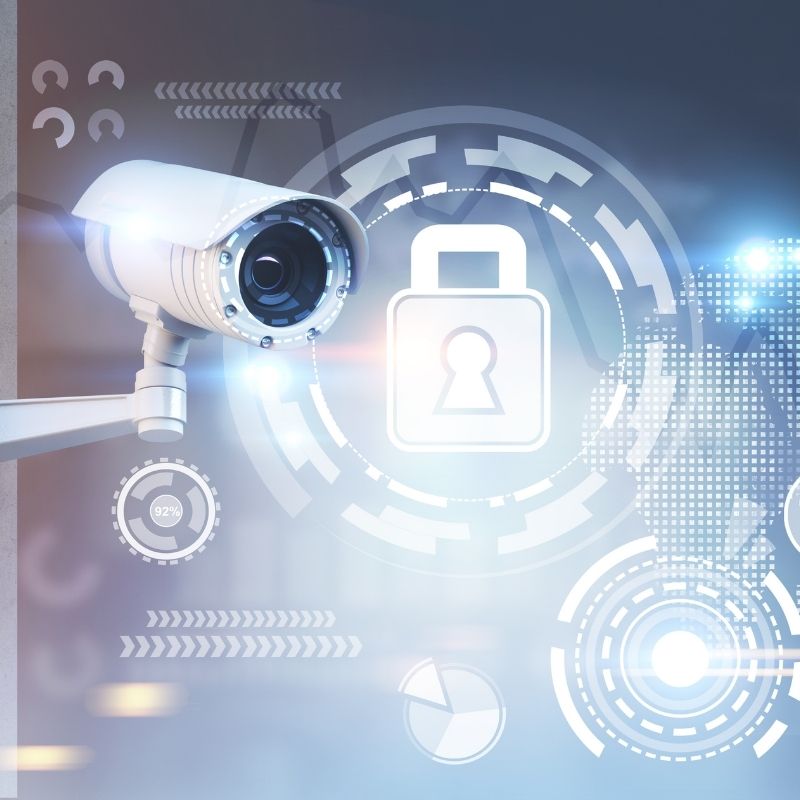**This article was published on 8/5/2016 and updated on 11/23/2021

Security and protection are imperative for any business, to protect workers, assets, buildings, and land. Early warning of an emergency like a fire, gas leak, flood, or a security breach like vandalism or an intruder threat is critical to protect what matters most. Surveillance video can provide a solution to commercial property owners and bring many benefits to businesses.
Types of Commercial Video Surveillance Systems
Many types of video surveillance systems exist for businesses, with evolving technology that is efficient, easy to use, and provides an added layer of security. Video cameras can be wired or wireless, with internet connectivity and computerized functions. Cameras can be programmed to send mobile alerts, begin recording upon motion detection or record on a continuous loop and can be set to automatically alert dispatch to send law enforcement personnel.
Surveillance cameras can be fixed or allowed to rotate for greater coverage, monitored in-house and/or remotely. Domed cameras placed strategically throughout the building are unobtrusive and are usually not noticed by the building occupants. These may be controlled remotely and can swivel 360° when needed. Some models are very durable and vandal-proof which is another important feature.
Cameras can also be installed for low-light or night vision capability or have features like a high speed license plate cam that can focus on vehicles that may be speeding away.
HRSS offers assistance in selecting the best type of surveillance cameras for your facility and provides fire alarm and security system design to meet code regulations as well as the needs of your specific facility.
Benefits of Business Video Surveillance Cameras
The most important benefits of video surveillance as part of your commercial security system are improving the safety and welfare of occupants and property. There are many ways in which video cameras for businesses provide those benefits such as:
- Increasing Overall Safety – with video cameras always on, security is automatically increased as any number of emergency situations are being watched and recorded.
- Prevent Theft and Shoplifting – retail businesses face unique challenges regarding dishonest shoppers and the risk of shoplifting. Cameras placed in strategic locations can help to deter shoplifting in the first place and help to identify and prosecute offenders.
- Prevent Employee Theft – small businesses in particular fall victim to employee theft. Video surveillance of areas over cash registers, safes or cash deposit boxes help to keep employees honest and management informed.
- Protects Against Burglary – an integrated security system featuring video surveillance is a big deterrent against burglars and any type of forced entry. Cameras have been an integral part of bring burglars to justice in many different types of breaking and entering cases.
- Reduces Risk of Vandalism – companies with video surveillance indoor and outdoor can steer away would-be vandals who look to damage your property. Vandalism can cost companies thousands of dollars in repair and risk building security with broken windows or doors.
- Protects Customers in the Store and Parking Areas – Protecting your customers on your property, inside and outside of your building should always be a priority. Many crimes occur in parking lots and by monitoring parking areas you help to keep your customers safe.
- Improve Your Bottom Line – Preventing incidents of theft, burglary and vandalism protect your assets and your checkbook. Video surveillance can also save money with insurance discounts if offered.
Video surveillance provides these benefits and others, bringing a sense of safety and security to business owners and their customers.
HRSS offers video surveillance systems as part of an integrated fire, life safety and security system for businesses of all sizes. We help you to evaluate all your options and choose the best type of security system for your property and operations. Contact us to learn more about implementing video surveillance for your business.
This article was originally published at: https://hrsschicago.com/security-alarms/benefits-commercial-surveillance-video/


